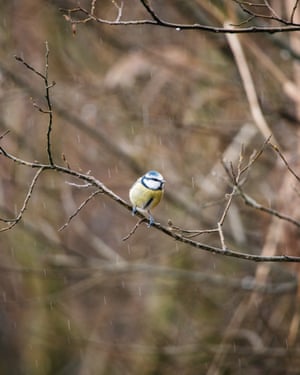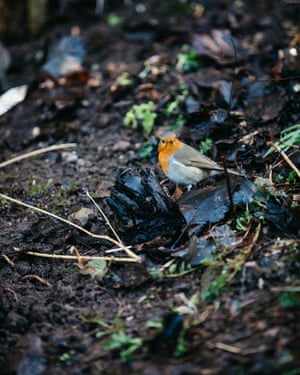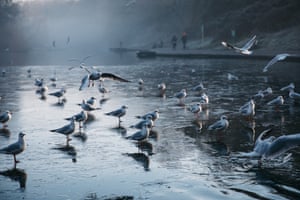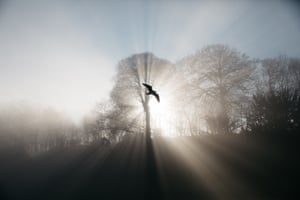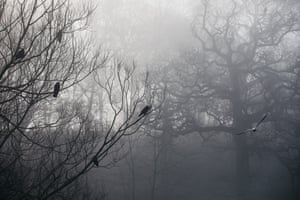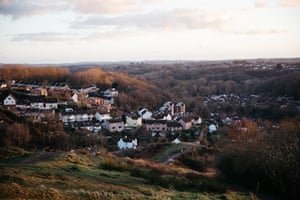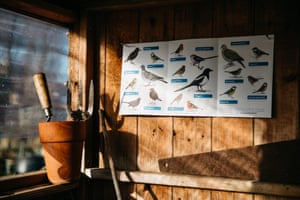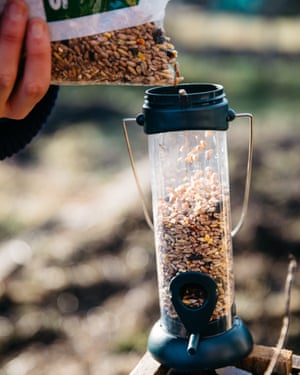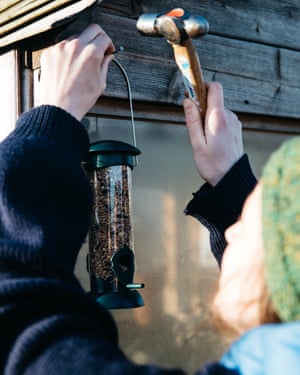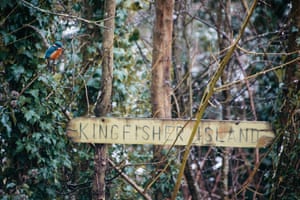For much of the past 12 months, while we haven’t been able to venture further than the local park or the end of our garden path, many of us have taken vicarious pleasure in following the flight paths of migrating birds, which are still free to spread their wings. The Arctic tern, for example, makes a UK stopover on its annual migration as it chases the sun between the Arctic and Antarctic summers.
Birdsong floating through our windows and into our homes has been one of the most joyful and uplifting sounds of 2020. And from Friday, the RSPB is asking us to stay tuned and join it for the Big Garden Birdwatch (BGBW), the largest citizen science project in the UK.
A blue tit gets caught in the rain; a robin hunts for food in freshly turned earth; Emma Friend and Caleb Socrates watch from their garden shed
“There has been unprecedented interest in the BGBW this year,” says Beccy Speight, chief executive of the RSPB. Since its inception in 1979, the BGBW has asked as many people as possible to record the number of birds of any species they see in their garden at any one time over a one-hour period.
“Last year, more than half a million people took part from their gardens or balconies, and we are hopeful for even more this year,” says Speight. “We offer a really good bird ID chart, which you can get hold of on the website, so don’t think, ‘I don’t know anything about birds therefore I can’t do it’. You can use it as a way to start learning how to identify them.”
10 of the best places to spot migratory birds in the UK
The success of the Self-Isolating Bird Club, “a virtual space for wildlife watchers and enthusiasts to share pictures and videos” created by Chris Packham the day before the first lockdown last March, suggests there will be more hawk-eyes and craned necks than ever before. Packham says “more than 10 million people” have engaged with the club online, and such a “profound response” has been uplifting.
“We wanted to draw attention to the fact that even humble everyday species could offer enormous interest, respite, joy, if you just took a second look at them. Or you stopped to listen to them rather than just hearing them. It was about getting people to take a further step of engagement, when it comes to the wildlife that surrounds them.”
Black headed gulls stand on a frozen lake in Eastville park, Bristol
The RSPB has a history of connecting people to birds, native and from far-flung shores. The society was founded in 1889 by philanthropist Emily Williamson in response to the trade in plumage for women’s fashion. Initially called the Plumage League, the all-women’s society cost 2d (1p in new money) to join, and forbade the wearing of any bird not killed for food – except ostriches.
Speight says: “It was the height of fashion to have exotic bird feathers and even whole dead birds on hats. These women were really concerned about that, and in particular about birds like the egret and the bird of paradise that were being threatened by this trade. They started the society to fight that.”
As a result of their pioneering work, the society gained its Royal Charter in 1904. In 1921, the Importation of Plumage (Prohibition) Act was passed, forbidding the shipment of feathers to Britain.
A herring gull soars above the Avon Gorge
The RSPB is now the largest nature conservation charity in Europe, with more than a million members, and manages 160,000 hectares for the preservation of nature. “We want to see a worldricher in nature, where people thrive as well,” says Speight.
In between lockdowns, the society’s 170 nature reserves were popular day-trip destinations, and during lockdown they have served as peaceful places for local people to exercise. Though many of us are now unable to visit these bird sanctuaries, we continue to look to the skies for comfort. “We’ve seen huge surges in terms of visits to our website, particularly around bird identification,” adds Speight.
Packham says: “It’s free, it’s cheap, it’s a walk in the park, it’s listening to birdsong, it’s putting up a window box, putting up a nesting box, it’s feeding those birds. It’s really simple things that everyone can do, and they have recognised that that can be such an asset to their lives.”
Amy Trotter, Matt Wainhouse and son Kitt have become budding ornithologists in lockdown
Matt Wainhouse and Amy Trotter say that as a result of being regularly taken walking through Eastville park in Bristol, their 15-month-old son Kitt is now a budding ornithologist. Kingfishers are the most famous residents of the park but, says Matt, “duck” was actually one of Kitt’s first words. “As soon as we weren’t able to escape the city, we started to explore local places more. We started to find lots of little paths that go off through the woodlands that we didn’t know were there. We’ve seen a lot more bird life.”
Carrion crows in a tree near Eastville park
Roanna Burt, from Bristol, is planning to participate for the first time in the Big Garden Birdwatch alongside her partner Liam O’Connor – and to make use of her Christmas binoculars. She says: “I’ve always been a nature nerd and I need to get outside, particularly if I am having a crap day. The lockdown, though, has highlighted how vital it is. Small things, like spotting a robin or a wren, can make a big difference. I hadn’t seen a wren in years.”
Clockwise from top: Troopers Hill nature reserve overlooking houses and gardens in Bristol; Harry Angus and Siobhan Lamb in their Bristol garden; Roanna Burt and Liam O’Connor in the allotment behind their house
The RSPB’s Speight says that watching birds is an accessible way of starting to find out more about nature. She adds that the BGBW gives a massive snapshot of the state of wildlife across the UK: “We ask people to submit their results either online or in hard copy. It all gets analysed and we publish the results in April. That data allows us to spot anything that’s changing in terms of our garden birds.”
Sadly, the data gathered over the 41 years of the survey shows a worrying trend, with the number of breeding pairs of birds in the UK decreasing by around 25%. Within that broader picture, there are even more concerning figures for individual species.
“In 1979, song thrushes were in the top 10, but by last year their number had declined by more than 80%. It’s a species that’s suffered,” Speight says. “The house sparrow, which still comes top most years in BGBW (1.3 million were counted last year), has declined by 53% since 1979. Starling numbers are also down by 80%.
“You start seeing these patterns, and it tells us where there are species that are in trouble. We can then do the work to find out what might be causing that, and how we can turn it around.”
A shed is converted into a makeshift hide complete with birdfeeder
Although many of the changes needed to address this decline are at policy level, the RSPB estimates that the land mass of all the gardens in the UK is more than all of the UK’s nature reserves combined. This means those of us with access to gardens, allotments or just a window can lend a helping hand to the UK’s beleaguered bird life.
“Birds use an enormous amount of energy trying to find the food they need to survive. If we can make that a bit easier for them by putting clean feeders out, more will survive the winter,” Speight says. “Water is equally important – making sure there is fresh clean water both for drinking and bathing. Letting your grass grow a little longer, not cutting back all of your trees and shrubs – all of those things help.”
An electric-blue kingfisher in Eastville park
As 15-month-old Kitt points with urgency and excitement at the electric-blue flash of a kingfisher, his mother Amy is optimistic about our newfound national interest in birdlife. “I think people have been changed in lots of ways by lockdown, and hopefully this will be one of the positive ways,” she says.
Speight says: “When you watch a bird in your garden, that bird is a completely other species carrying on and living its life in a different way, but it’s doing it 10 feet away. I think from the enjoyment you might get watching blue tits on your feeder, you can then open the door to this bigger story about what’s happening to our natural world and how we can all play a part in helping it.”
Packham agrees: “People have come to like the fact that they are contributing to something meaningful, which will inform better conservation. It is part and parcel of the whole thing now: when I was a kid you just liked birds; now, if you like birds, you’ve got to like looking after them.”
• To download a free bird identification pack and find what is needed to participate in the RSPB 2021 Big Garden Bird Watch, 29-31 January, go to rspb.org.uk. The Self Isolating Bird Club is hosting a watch that people can join in with at 10am on Saturday 30 January on RSPB Video on YouTube
Source: Read Full Article










